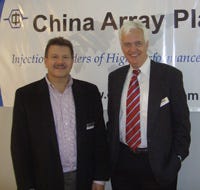The Wild West days of shipping plastics processing work to China may be past, but the country still offers processors a world of opportunity. Stretching around the world is China Array, a small plastics processor with a long history in the country.
April 14, 2009
The Wild West days of shipping plastics processing work to China may be past, but the country still offers processors a world of opportunity. Stretching around the world is China Array, a small plastics processor with a long history in the country.
Russell Johnson founded Spectra International Inc., China Array’s predecessor, and went to work sourcing stainless-steel food processing equipment for the U.S. market. His first partner was a massive, state-owned company, but he worked with and sourced from many others, including those privately owned, before China Array began its own injection molding operations in 1995. Since then, the plastics processing business has become the company’s largest revenue generator, says Johnson, who spoke with MPW about the joys and challenges of working in the world’s most populous country.
|
Making the decision to move work to China was never easy, and that has not changed in the past months of financial upheaval. “It’s a stubborn process. People are having to pick out which parts in their line can be moved to China,” notes Johnson. But he adds, “Customers who we talk to are ones who have reviewed their product line, know which products or parts they can move to China, and also want to have some assurance that their project is in good hands.” Most of these customers are multinationals, though he also sees strong domestic demand growth as an opportunity for the processor.
Because China Array is involved in high-end projects, Johnson says, it gets to participate in many different industries, which helps it stay busy and offers some level of financial certainty. “You have to have a certain amount of diversification,” notes Carl Olson, VP sales and marketing at the company’s Pittsfield, MA headquarters for design and sales. Pittsfield is also home to Sabic Innovative Plastics, the former GE Plastics—Olson’s longtime prior employer. “The best university I could have gone to was GE Plastics,” he says, recalling the wide variety of companies from an even wider variety of industries and markets that made the trip to Pittsfield in search of help.
Neither man downplays concerns about intellectual property protection in China. “We own the factory and our engineers equipped it. The person who runs it in China, I’ve known him for 16 years. We’ve full control,” says Johnson. He adds, “This (IP protection) is huge in China. We give (our customers) the same comfort level on IP (as they’re used to elsewhere). We are aware it’s a critical issue.”
The company has started doing some assembly though the bulk of its business remains shoot-and-ship molding. “Our company in a nutshell: We injection mold high-performance thermoplastics,” states Johnson. He adds that he has more than a decade’s work experience in the area around China Array’s facility, so that, “When we source, it’s within 20 miles of our factory and all from companies I’ve known for years.”
Johnson says the perception that China’s rapid growth is bound to drive labor costs higher, quickly, is a false one.
“This (perception) overlooks the population of China and the number of people entering the workforce every year,” he says. He does say there has been a clear shake-out in China at the low end of the molding industry. China Array, though, plans to add two new injection molding machines this year, doubling the number currently running there. Adds Olson, “The Chinese market for injection molders is pretty unique. We all understand the low-cost side of the market. But what we do generally only works in a smaller company.”
Johnson has no concerns about other processors coming to China, but advises they be prepared to pay their dues. “Don’t underestimate the difficulty in setting up something like this in China ... I personally would never consider going to China without a lot of on-the-ground experience. You have to pay your dues. Experience remains the best teacher.” —[email protected]
About the Author(s)
You May Also Like



